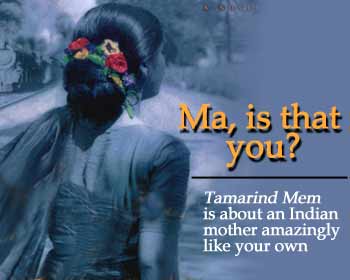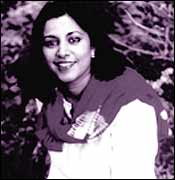Home > News > Specials
The Rediff Special/Sonia Chopra
January 07, 2003

Anita Rau Badami discovered India through the windows of passenger trains. Her father, a mechanical engineer with the railways, was relocated frequently and she grew up across India, adjusting to the trials, triumphs, and tribulations of a family constantly on the move.
Years later, after she migrated to Canada, she began graduate school and ended up writing a novel set in the railway colonies of north India, Tamarind Mem, as her master's thesis.
Her central character Saroja is nicknamed Tamarind Mem because she has a caustic tongue, which is her weapon against anger and frustration. And she saves her worst for husband Vishwa, a mechanical engineer with the railways, and daughters Kaman and Roopa.
"Life was hard for her, so I gave her a sharp tongue to help her deal with it," says Badami, 40. "Anyway, characters with namak [salt] are more interesting. I didn't want to make her the stereotypical boring, submissive Indian woman because most women I know aren't that way."
In case you are wondering, Saroja isn't a takeoff on the author's own mother Nalini, a nice, kind woman living in Bangalore who passed on her love of books to her daughter. Badami's father Ramakrishna died several years ago and her younger siblings Anand and Priya live in California.
"When the novel first appeared, I had a lot of people coming up to me and asking, 'How do you know my mother?' Apparently, she reminded a lot of people of their own mothers!" says Badami.
The book is pure fiction, written astutely and perceptively, looking back in time to analyse the relationships in a complex family. At its core lies the eternal conflict between mother and daughter.
Badami also plays around with the conflict that occurs when two cultures collide, when traditional values clash with modernity.
"I think fiction writers use whatever is familiar to themselves and then turn it into fiction," she says. "They take a fragment of the truth and use it as an emotional or narrative jump-off point to create another reality."
She was born in Rourkela in Orissa, but lived all over eastern and northern India. She grew up speaking English at home, was educated at convent schools, was an avid reader -- and so writing came naturally to her.
 As a young girl, she lived on a steady diet of Enid Blyton, Agatha Christie and P G Wodehouse, among others. Today writing means everything to her, and she has been doing it professionally for 22 years. At age 18, she sold her first short story for Rs 75 to Femina, which money she promptly spent on five or six books.
As a young girl, she lived on a steady diet of Enid Blyton, Agatha Christie and P G Wodehouse, among others. Today writing means everything to her, and she has been doing it professionally for 22 years. At age 18, she sold her first short story for Rs 75 to Femina, which money she promptly spent on five or six books.
Badami began her career armed with a bachelor's degree in English from the University of Madras and a diploma in social communications media from Sophia College, Mumbai. She worked as a copywriter for advertising agencies in Mumbai, Bangalore, and Chennai for three years, freelancing all the while for newspapers and magazines, including The Indian Express, The Hindu and Deccan Herald.
In 1984 she married Madhav Badami, who is currently a professor of environmental studies at McGill University, Montreal. Seven years later, she and her husband migrated to Canada. They lived in Calgary, where Badami got her master's from the University of Calgary, and Vancouver before moving to Montreal with their son Aditya, now 15.
"When I came to Canada, I didn't know much about the political, religious and social dynamics of the society here, so I wrote fiction," she says. "I did know about the world I left behind. I knew it thoroughly and I knew how someone from India would react to particular situations."
The Tamarind Mem was first published in 1996 worldwide, except in the US. It was published in the US as the Tamarind Woman in 2002, a year after Badami's second novel, The Hero's Walk, which has established her in literary circles.
The Hero's Walk is an acknowledgement of ordinary and extraordinary acts of heroism in daily life. "I find it touchingly heroic to just see people living from the day they are born until the day they die, so full of hope," she says.
Badami has a good eye for detail, the gift of capturing memories in their entirety and translating them into fiction. Details of a life coloured by British manners and habits are well documented in Tamarind Mem -- the Anglo-Indians, the awareness of the smell and feel of trains and stations, Catholic convents, and the superstitions repeated by servants to the children.
In the book, the chasm between the mother and daughter, their inability to communicate with each other, is both sad and humorous.
Subtly, Badami shows how people can have very different perspectives about the same incidents by dividing the book into two parts: one, the recollections of Kamini, the other, those of Saroja.
Saroja is larger than life. But Kamini with her intelligence and perception is a good match for her. Vishwa is 'old and tired' and is 'unable to forge a connection with his family'. Kamini questions everything and Roopa is one who simply accepts things the way they are.
Kamini travels abroad to pursue higher education in Calgary and in a way fulfils Saroja's lost dream of becoming a doctor. The mother had no choice but to get married to a man almost a decade older. Roopa marries and migrates to America.
Ultimately though, Saroja shocks everyone by making an unconventional choice -- after her husband dies and the daughters begin their own lives, she sells her house and journeys across India, alone, by train.
She wants to see the country on her terms, according to her schedule, and through her conversations with other passengers we learn exactly why she is so defensive, what her disappointments and dashed dreams are.
Badami makes Saroja travel for two reasons: because it is every woman's fantasy to "cut loose" and "it's unfair that the mother always has to stay home either for the kids or for her retired husband".
A frustrated Saroja is caught in her traditional role as an Indian wife and mother who must always be the epitome of an ideal woman -- cooking, keeping house and raising children.
She stuck to a man who was married not to her but to his job and that dedication angers her so much she has lengthy, one-sided screaming arguments with him, which are met with indifference and silence and usually end with her sobbing loudly.
As a child, Kamini blamed her mother for being angry all the time and sympathized with her father who always loved and was gentle with his daughters. As an adult, she understands it must not have been an easy marriage for her mother because her father "left again and again and every time he came back, he needed to be readmitted into lives altered daily during his absence". And her mother could never have "lasting friendships" or was admitted into her husband's "private world of journeys".
There are hints that Saroja rebels. She manages to persuade her parents to let her finish high school and has a brief flirtation with an Anglo-Indian car mechanic Paul da Costa, while her husband is away.
Badami's second novel won the Commonwealth Best Book Prize in the Canada/Caribbean region, The Marian Engel Award, and was nominated for the 2002 International IMPAC Dublin Literary Award as well as the Orange Prize 2002.
Though writing is a major part of who she is, after the book is out, doing the book tours, the readings, the invitations and festivals exhaust her. That's why there is a gap of two to three years between her books.
She writes at home, but is disciplined about it. She observes office hours, from 9am to 3pm, and while writing, she doesn't read any fiction that is similar to her plot. But she does read old classics and non-fiction. Reading helps her write, she says.
"I read continuously, hundreds of newspapers and magazines, all the time," Badami says. "I have a heightened awareness of the world around me. I need to keep in touch with the world and I like collecting facts, news items, odd bits and pieces. In that way, I think writers are like squirrels. We are constantly storing away little nuggets of information that we put in our fiction."
She is working on her third book, set in south India and Vancouver. The working title is Can You Hear The Night Bird Sing?
"I think Indian writers have been writing marvellous fiction for many years, but it hasn't been in English, so the West hasn't always heard of it," Badami says. "But a new generation of Indian writers born here or in India, writing confidently in English, has opened new doors to fiction about being Indian anywhere in the world."
Badami writes literary fiction and hopes to reach readers of discerning taste, who enjoy variety. "The names of the characters may be different, their landscapes exotic, but at the heart of every story is the universality of relationships between people and that's why people buy the books," she says.
The Rediff Specials